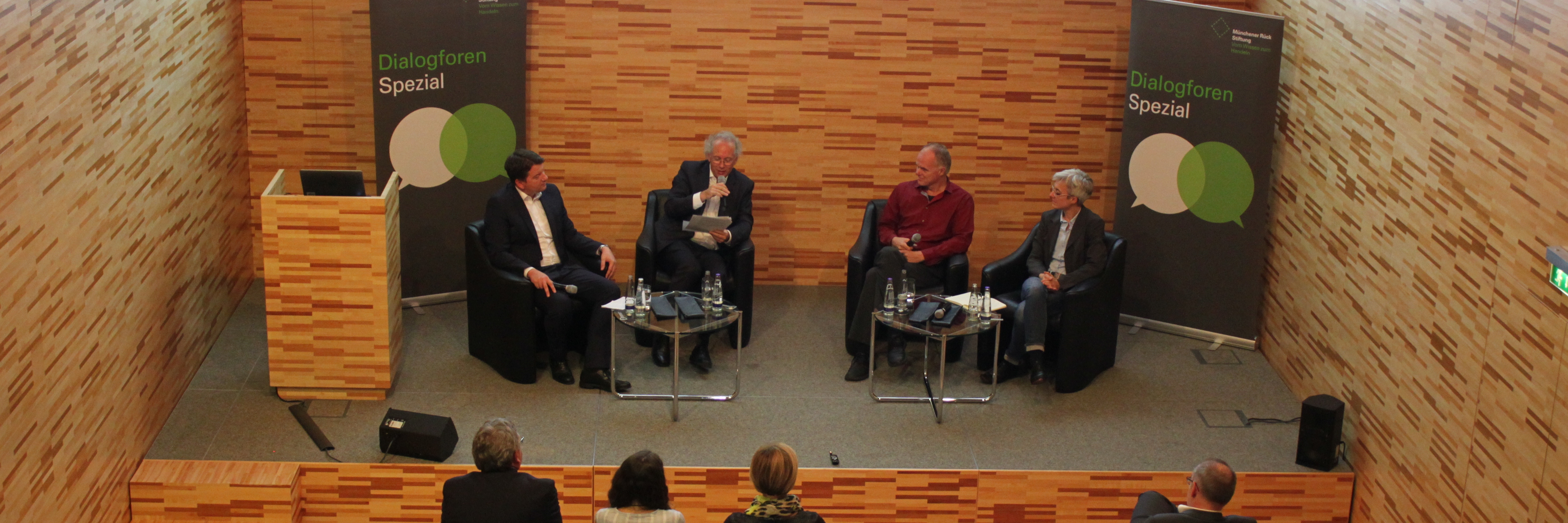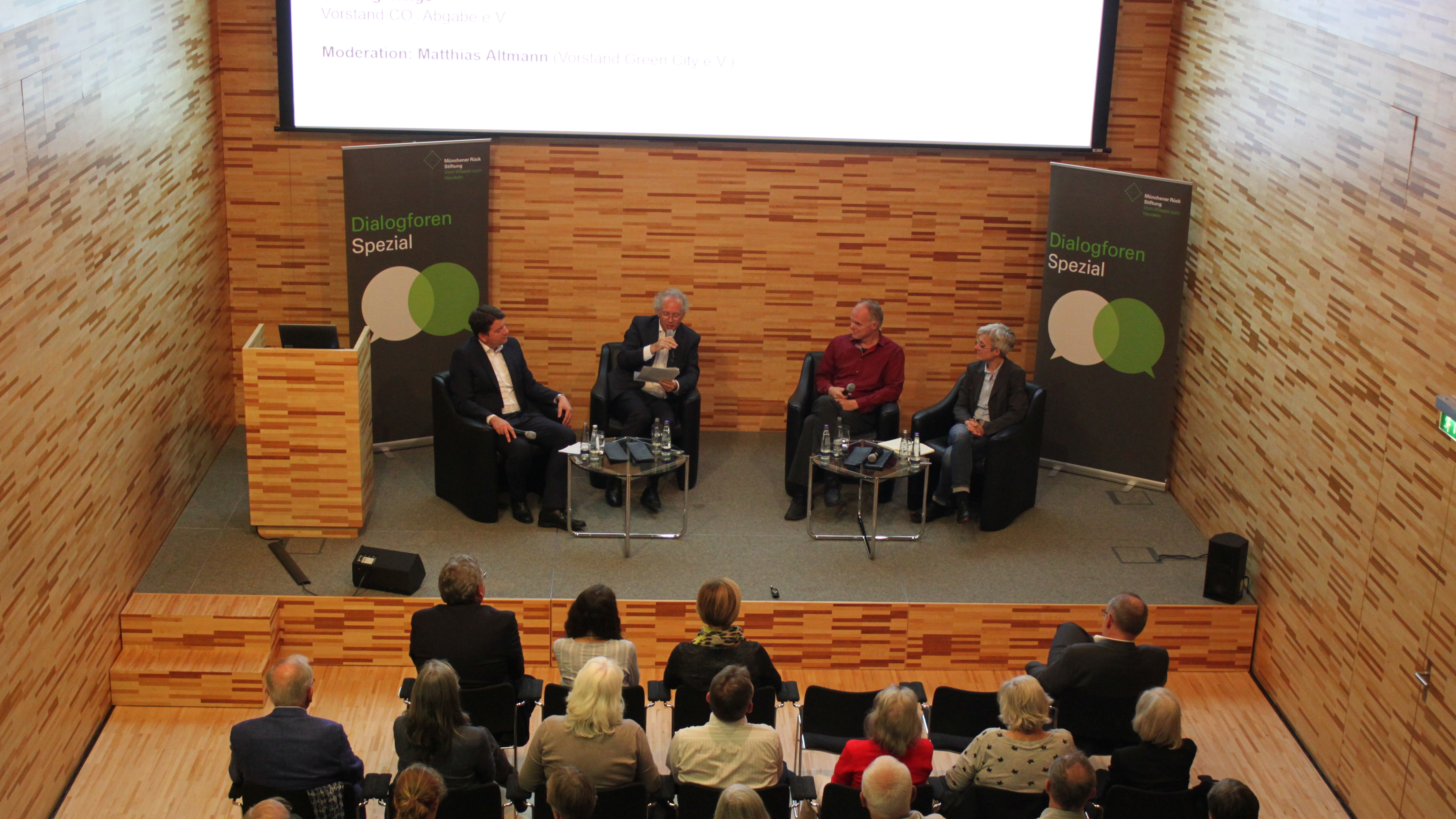
Carbon charges and mobility in the urban environment – What would be the benefits of a climate tax?
Dialogue Forum special as part of the "Münchener Klimaherbst" on 22 October 2019
properties.trackTitle
properties.trackSubtitle
Almost 20% of carbon emissions in Germany are generated by the transport sector. Meanwhile, many cities like Munich are plagued by traffic congestion. Can a charge for carbon emissions remedy the situation? And if so, is a model of this kind socially equitable? Or does it disadvantage particular income groups or German industry? The discussions between the experts at the special dialogue forum were heated at times.

The transport sector poses the biggest headache for climate protection advocates. Despite the fact that engines have become much more efficient in recent decades, we are travelling more and more today, and often in heavier cars. According to the German Federal Environmental Agency (UBA), car traffic alone increased by almost 18% between 1995 and 2017. As Dr. Brigitte Knopf, General Secretary at the Mercator Research Institute on Global Commons and Climate Change (MCC) underlined, countermeasures are urgently needed because time is running out. “If we want to limit the increase in global temperature to between 1.5 and 2 degrees, we must introduce no more than 800 gigatonnes of carbon into the atmosphere.”
Carbon tax has a three-pronged effect
She argued in favour of a carbon tax, or alternatively the development of an international emissions trading system. Both instruments could be designed to make it almost equally expensive to generate emissions. The scientist explained that this would help achieve three objectives at once: “We would make fossil fuels more expensive, and renewable energies more attractive, stimulate investment in low carbon technologies, and we could return the revenues to the general public, or invest them in expanding the public transport system.” However, she believed the carbon charge decided on by the federal government in its climate package (initially €10 per tonne from 2021) is not high enough. “If we want to meet the savings targets for 2030, we need an immediate starting charge of €50 per tonne, rising to €130 by 2030,” she explained. She is critical of the higher commuter allowance that was also agreed in the climate package, believing it provides the wrong incentives, as well as being socially unfair because it mainly favours higher income groups and long-distance commuters.
Dr. Jörg Lange, chairman of the association “CO2 Abgabe”, is also convinced that the federal government’s climate package does not go far enough in many instances. “If Germany is to achieve the Paris climate protection targets, it needs to reduce its greenhouse gases by at least 54%, or 466 million tonnes per year, by 2030. With the current measures, we will achieve a third of this reduction at most,” he reckoned.
Politicians need to make compromises
For politicians, it is often far from easy to implement the recommendations of scientists since they always have to think of their voters. Sandro Kirchner, Chair of the Committee on Economic Affairs, Regional Development, Energy, Media and Digitisation at the Bavarian State Parliament, pointed out that, while respondents were all in favour of greater climate protection in surveys, there was a lower approval rate in terms of people’s willingness to actually accept restrictions for themselves. It was the job of politicians, he said, to reach a compromise, but it was no easy matter. “Industry needs the opportunity to go along with the change so that people can keep their jobs,” he emphasised.
He argued that a carbon charge could prove a useful control instrument, but said it should apply globally and include all sectors. The Bavarian politician feared that going it alone on a national level would lead to competitive and regional handicaps. At the same time, a number of other countries who introduced emissions taxes some time ago are ahead of Germany in this context. Kirchner said that Bavaria had many energy-intensive enterprises, who were being seriously impacted by the climate discussion, and who would also be raising the issue of location. If they relocated their production abroad, carbon emissions might become higher, which would do nothing for the climate. He added that urban and rural areas should not be played off against each other, since each area needed its own solutions. “In the country, people rely more heavily on individual mobility because public transport is limited. So people living there should not be left in the lurch,” he said. Instead of prohibition, Kirchner advocated incentive systems and innovation to drive the necessary changes. “We managed to combat the hole in the ozone layer and remove harmful CFCs from the atmosphere without banning all refrigerators,” he pointed out.

Great potential savings in the energy sector
Lange made clear that virtually no one was currently calling for a ban on energy-intensive industry in Germany. However, he said industry had to reduce emissions. In general, he wished that people would talk less about targets, and more about measures. That way, millions of tonnes of carbon could be saved. Anyone working with the material was aware that, in the context of the annual review prescribed by the EU, savings targets would not even be met in 2020. “In such a situation, emergency measures need to be taken,” he argued. He believed there would be a public outcry. Lange saw enormous savings potential in the energy sector, believing that emissions in this area could drop substantially if a carbon charge was introduced. “The big power plants in Germany alone emit around 300 million tonnes of carbon each year,” he pointed out. Of this amount, 200 million tonnes could be saved if even a moderate carbon charge is decided on. The charge will increase from €40 per tonne today to €90 in 2030.”
How expensive could it become if we – and many other countries besides – fail to achieve the targets for 2030? “For me, it is not a question of cost, because we would be jeopardising our very livelihoods,” said Lange. In 2016, the Federal Environmental Agency tried to make the impact of climate damage more tangible, and estimated it was costing €180 for each tonne of carbon emitted. “The costs will increase to several hundred euros per tonne by 2050,” he predicted. “It will be much more expensive than today to get climate damage under control to some degree.” One thing that is certain is that it will prove expensive for German taxpayers, because penalties of up to an estimated €60bn will be payable to the EU if we fail to meet the targets for 2030. “That is why the Government has left the door open for a serious revision of climate change measures from 2026, with the option of introducing binding emission limits,” added MCC General Secretary Knopf. This means we are wasting valuable time.
Companies are further ahead than politicians
“If we do not achieve the targets, then of course there will be penalties,” conceded Kirchner. “The question now is whether tightening the screws would make things even more expensive.” The economy could collapse and tax revenues would not then be available.” Lange responded that there was no other choice than to push the restructuring of the economy and the development of infrastructure. He said that many companies have done more in this context and, internally, would have been expecting the introduction of carbon charges for some time. “Politicians in many cases are just playing catch-up and following the lead of the industry associations,” he added. But he felt it was important that the latter reflected the opinions of the individual companies. He proposed creating more space for innovation in companies, and launching new business models to ensure a smooth transition to reduced emissions. He warned that the changeover would be much more difficult if we waited until 2025. Lange was convinced that, if we had started 30 years ago to charge €10 per tonne for carbon emissions, and had slightly increased the price each year, the situation today would be very different.
The evening’s discussion made clear that climate protection will come at a cost. But it will be even more expensive if we do not rapidly reduce carbon emissions. Politicians, business leaders, and other interest groups will doubtless be discussing the distribution of costs for some time to come. However, one thing is certain: if the climate package the federal government approved in 2019 is not revised, Germany’s climate targets will be at risk.
28 October 2019